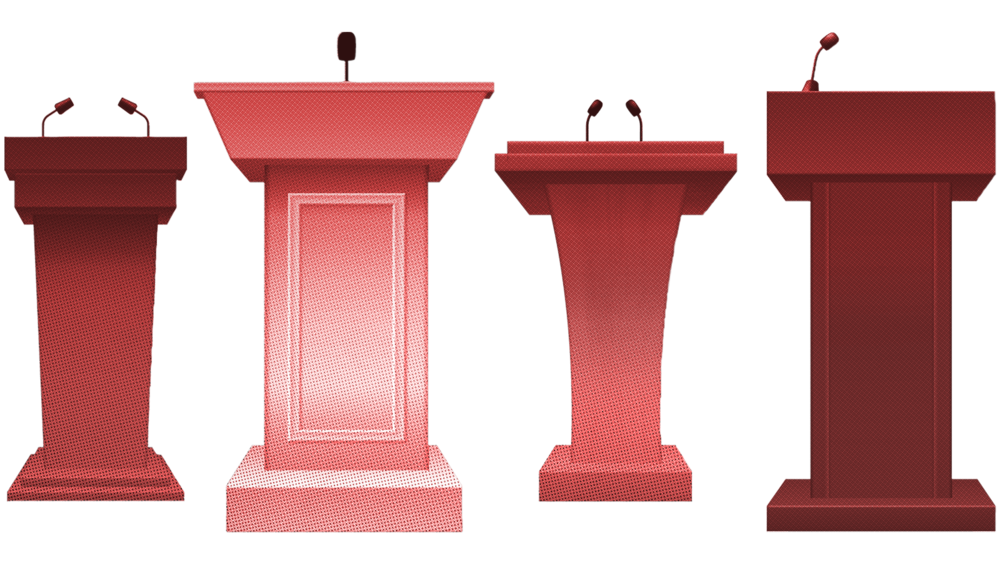

Who Won The Second Republican Debate?
We partnered with The Washington Post and Ipsos to poll voters before and after the candidates took the stage.
It was hard to crown a winner after Wednesday night’s chaotic Republican primary debate, as the candidates seemed more interested in talking over each other than answering the questions they’d been asked. So maybe it’s not surprising that the debate didn’t seem to change many voters’ minds.
That’s according to a brand-new 538/Washington Post/Ipsos poll, conducted using Ipsos’s KnowledgePanel in the hours immediately following Wednesday’s debate. We asked likely Republican primary voters who watched the debate to grade each candidate’s performance. And to see if those performances actually changed anyone’s views, we asked likely Republican primary voters (including both debate watchers and non-watchers) their opinions of the candidates both before and after the debate. Here are the results:
The over- (and under-) performers
How well likely Republican primary voters who watched the debate expected each candidate to perform before the debate versus how well they thought each candidate actually performed
We asked respondents how they expected each candidate to do, and how well they actually did, on a five-point scale from “excellent” to “terrible” and converted each answer to a number on a 1-to-5 scale. “Excellent” was equal to 5, “very good” was equal to 4, “about average” was equal to 3, “poor” was equal to 2 and “terrible” was equal to 1. Scores were then averaged to create overall scores for each candidate. Respondents who answered “don’t know” to the expectations or performance questions were excluded.
Our poll asked respondents who watched the debate to grade each candidate’s performance on a five-point scale from “excellent” to “terrible.” Based on each candidate’s average score,2Average scores were calculated by assigning a 1-to-5 score to each answer to the expectations and performance questions, where “excellent” was equal to 5, “very good” was equal to 4, “about average” was equal to 3, “poor” was equal to 2 and “terrible” was equal to 1. Scores were then averaged to create overall scores for each candidate. Respondents who answered “don’t know” to the expectations or performance questions were excluded. Florida Gov. Ron DeSantis had the strongest performance. But he also had high expectations going into the debate (based on a question we asked before the debate using the same scale), so he may not get a ton of credit for his performance. In fact, voters thought all four candidates from whom they expected big things mostly lived up to the hype, while all three candidates for whom expectations were low lived up (down?) to those expectations. That said, expectations were quite high for businessman Vivek Ramaswamy, and he only barely turned in an above-average performance in voters’ eyes. He was once again the subject of a lot of attacks from other candidates, so those may have taken a toll.
We also asked debate watchers to grade the performance of the moderators, who seemed to lose control of the discussion at times. (More than once, the candidates interrupted them as they tried to move on to a new topic.) And they got pretty mediocre marks: Their average performance score was a 3.06 out of 5 (where 5 is excellent). By contrast, Republicans who watched the August debate gave those moderators an average score of 3.38.
Who gained and lost support
Share of likely Republican primary voters who are considering voting for each candidate after the debate compared with before it
Now for the question you — and the candidates — have all been waiting for: Will any candidate gain or lose support as a result of the debate? We asked likely Republican primary voters (including both debate watchers and non-watchers) which candidate(s) they were considering voting for (respondents could choose multiple options) and compared the results to what they said before the debate. And … nothing really fundamentally changed about the race. The candidate who gained the most potential supporters was North Dakota Gov. Doug Burgum, but that fact mainly highlights how little change there was, because he increased only from 5 percent before the debate to 8 percent after it. No other candidate’s potential support moved by more than 3 percentage points. Despite skipping the debate, former President Donald Trump continues to dominate the race: 64 percent of likely Republican voters are at least considering voting for him.
The popularity contest
Candidates' favorable and unfavorable ratings among likely Republican primary voters before and after the debate
Unfavorable
Favorable
Before debate
No opinion/Never heard of
After debate
We also asked the same likely Republican primary voters (again, including both debate watchers and non-watchers) their opinion of each candidate both before and after the debate. And once again, nothing fundamentally changed. Burgum was the only candidate to significantly increase his favorable rating, going from 13 percent of Republicans viewing him favorably to 19 percent. But the exposure he got in the debate was a mixed bag, because his unfavorable rating increased by even more (13 percent to 22 percent). Scott, Ramaswamy, Haley, Pence and DeSantis also all got a little bit more unpopular after the debate. It’s possible that the squabbling on stage reflected poorly on all of them.
Which issues matter most?
Share of likely Republican primary voters who said before the debate that each issue was among the most important to determining their primary vote
The top {{ top_n }} issues are shown. Other issues are {{ other_issues }}. Respondents could select up to three issues from a list of 20, with additional options for “something else” and “don’t know.”
Finally, before the debate, the 538/Washington Post/Ipsos poll also asked likely Republican primary voters what issues would be most important in determining their primary vote. (Respondents were allowed to select up to three issues from a list of 20.) For Republicans who responded to both waves of our poll, the most important issue was getting inflation or increased costs under control (55 percent). Controlling immigration was also a priority for 40 percent. It was fitting, then, that the first segment of the night was about the economy, and the topic that ended up getting the most airtime, according to The New York Times, was immigration.
All the data presented here comes from polling done by Ipsos for 538 and The Washington Post using Ipsos’s KnowledgePanel, a probability-based online panel that is recruited to be representative of the U.S. population. The same group of respondents was interviewed before and after the Republican presidential debate on Sept. 27, 2023, to track whether and how their answers changed. The first wave of the poll was conducted from Sept. 19 through Sept. 26 among a general population sample of adults, with 5,002 respondents who said they were likely to vote in their state’s Republican primary or caucus. For the likely Republican primary voter subset of respondents, the first wave of the poll has a margin of error of ±1.6 percentage points.
The second wave of the poll was conducted late on the night of Sept. 27 and early in the morning on Sept. 28 among 2,262 of the likely Republican primary voters who had previously responded to the first wave; it has a margin of error of ±2.3 points. Of those respondents, 730 watched the debate. The subset of debate watchers carries a margin of error of ±4.1 points.
Click here for a full methodology.
Editing by Amelia Thomson-DeVeaux and Maya Sweedler. Copy editing by Cooper Burton. Visual editing by Christopher Groskopf. Additional contributions from Mary Radcliffe. Art by Katrina Stapleton.

Comments